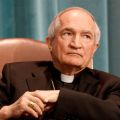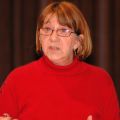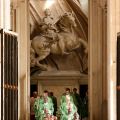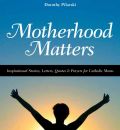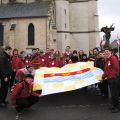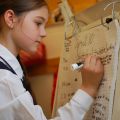U.S. report shows shift in Mexican migration, but causes are less clear
By Patricia Zapor, Catholic News ServiceWASHINGTON - The timing of Pew Hispanic Center's report saying Mexican migration to the U.S. had leveled off or reversed course ensured that it would get prominent play April 23 and 24.
Coming just two days before the Supreme Court heard oral arguments in Arizona v. United States over that state's law cracking down on undocumented immigrants in the state, the report was cited widely in stories providing context for the supposed effect of such laws.
But while the dense, 42-page Pew Hispanic report points to a clear shift in migration patterns for Mexicans, its discussion of the possible causes for that change is far less clear.
Self-regulating markets don't serve common good, Vatican official says
By Cindy Wooden, Catholic News ServiceVATICAN CITY - The global financial crisis and the worldwide recession it triggered have demonstrated that allowing financial markets to self-regulate does not serve national interests and the good of the international community, a Vatican official said.
"The international community cannot let the financial system continue being a source of global economic instability; it must urgently take measures to prevent the outbreak of other financial crises in the future," said Archbishop Silvano Tomasi, the Vatican's permanent observer to U.N. agencies based in Geneva.
The archbishop made his comments April 22 during a top-level meeting of the U.N. Conference on Trade and Development, which was being held in Doha, Qatar. His office distributed the text of his speech April 25.
Religious leaders worry there could be war between Sudan, South Sudan
By Cindy Wooden, Catholic News ServiceVATICAN CITY - Late April aerial bombardments, ground-force skirmishes and especially the increasingly hostile rhetoric of the leaders of Sudan and South Sudan had religious leaders worried about the possibility of all-out war.
The key problems are conflicting claims over oil revenues and the lack of a firm, internationally recognized border between Sudan and South Sudan, which became independent last July.
"The international community must help us to demarcate the border," Archbishop Paulino Lukudu Loro of Juba, South Sudan's capital, told the Vatican's Fides news agency April 24.
Hidden helpers: Vatican ushers bring tots, disabled closer to Pope
By Cindy Wooden, Catholic News ServiceVATICAN CITY - The cameras are trained on the cute baby being foisted up to the pope for a kiss and papal blessing, not on the dapper gentleman trying to handle the precious, often squirming, load with care.
Vatican ushers attend every weekly general audience, helping visitors with special needs and picking out the cutest babies in the crowd for the photo op of a lifetime. And they welcome dignitaries and heads of state visiting the pope with all the pomp and circumstance suited for their stature as "gentlemen in waiting."
These laymen, called "sediari" or chair-bearers, did just that for centuries: carried the pope on an elevated chair high above the crowds so everyone could catch a glimpse of the pontiff.
But Blessed John Paul II discontinued the practice when he was elected in 1978, preferring to walk and be close to the people.
The "sediari" stayed on, but their role no longer included carrying the pope on their shoulders -- until Blessed John Paul's death more than 26 years later.
When he died, Blessed John Paul's body had to be carried by 12 papal gentlemen on a red velvet stretcher in a solemn procession from the Apostolic Palace to St. Peter's Basilica.
Because so many of the papal ushers were young, only a few older veterans knew how to carry a pope either on the portable chair or the stretcher.
All ushers' eyes and ears were on Massimo Sansolini, who served four popes after he became a "sediario" in 1964.
He spelled out the correct procedure for smoothly and decorously lifting and carrying the papal platform so that it would stay as horizontal and secure as possible while the men navigated corridors and numerous marble staircases.
Two of his essential rules: "Carry it with just the shoulder, without help from the hand" and always begin walking with the left foot.
The rules were in his recently published Italian memoir, a follow-up to a volume he published in 1999 in which he told of his life as a papal gentleman, revealing the not-often-seen world of the Apostolic Palace, at the service of the pope.
Sansolini told reporters at the second book's launch April 23 that because there were always 12 "sediari" helping the pope -- the vicar of Christ -- he always felt like one of the apostles -- a servant of the servant of God.
In his book, he described how hard the men tried to remain calm and composed, fighting back the tears, as they transferred the pope's body before the crowds April 4, then carried the cypress casket from St. Peter's Basilica outside to the square during the April 8 funeral.
"No layperson had ever been as close to the sacred person of the pontiff as we had for 26 years straight," he wrote.
While those events briefly put Sansolini and his confreres in the world spotlight, their weekly routine is much less visible.
For the past 16 years, Sansolini has been in charge of helping disabled pilgrims get seating as close to the pope as possible during Wednesday general audiences and other special occasions.
There are special sections in the square or the Paul VI audience hall for church dignitaries, important guests, newlyweds and people with special needs. All the ushers also have their eyes open for parents with tiny infants and help them get as close as they can to the barricade in the general seating section to pass the baby to the pope in the popemobile.
Sansolini said no pope has ever complained about the tradition of individually greeting and blessing the disabled after the general audience, no matter how scarred or infirm they may be: "The pope's love knows no limits."
A typical Wednesday starts very early as Sansolini arranges the seating for the disabled section, leaving room for the wheelchairs between the plastic chairs for the caregivers.
Guests are asked to arrive a couple of hours early before the start of the audience so they can clear security and find their section.
Sansolini said he helps pass the time with all of them, chatting about their lives in whatever language they have in common. Sometimes, he said, just a caress or smile is all that it takes to forge a strong bond.
He said he has been humbled by the heroism of the mothers, fathers and caregivers of the gravely ill and physically or mentally challenged adults and children he sees every week.
"There are women like Mother Teresa all over, on every continent," caring for the unwanted or abandoned.
He said he is always touched by people he meets, from those afflicted with terminal cancer to Iraqi children bearing battle scars, "their tiny bodies, already martyred" in the bloom of their life.
Once he saw a mother come to the audience hall laden with bags and cases, which she scattered on the floor around her.
He was going to gently say something about the disarray, but let it go. He was glad he did, he wrote, because later she pulled out a series of bottles and a syringe and proceeded to feed her child through a stomach tube.
"Every time I am present at an audience I come out with greater faith" from witnessing the unconditional love, joy and hope in people, he said.
"The love of a parent overcomes everything! The human being reaches a fullness of dignity that knows no limits" when it overcomes all challenges and suffering with love and grace, he wrote.
Toronto students to begin their day singing ‘O Canada’
By Vanessa Santilli-Raimondo, The Catholic RegisterTORONTO - Students in Toronto Catholic schools will now begin their school day by singing our national anthem each morning.
On April 19, the Toronto Catholic District School Board voted 7-3 to have students sing “O Canada” a cappella during opening exercises.
To lead by example, trustee Angela Kennedy, who spearheaded the vote, uploaded a video of herself on YouTube singing “O Canada” without any background music.
Religious liberty: Why a battle 1,700 years ago is relevant today
By Cindy Wooden, Catholic News ServiceVATICAN CITY - For Vatican historians, the roots of a Christian idea of religious liberty go way back: in fact, back 1,700 years to the Emperor Constantine's victory on Rome's Milvian Bridge and to his conversion.
At a Vatican conference in late April marking the anniversary, the head of the Pontifical Committee for Historical Sciences said Constantine's victory in 312 under the sign of the cross was "the foundation of a new world" marked by religious freedom for Christians and separation between church and state.
Tell The Catholic Register why your mother matters
By Catholic Register StaffThe deadline for submissions has now passed.
-
Last fall Catholic Register Books published Motherhood Matters: Inspirational Stories, Letters, Quotes & Prayers for Catholic Moms. Written by Register contributor Dorothy Pilarski, the book was praised for its “home-spun wisdom,” “inspirational vignettes” and “practical advice.”
The lessons contained in Motherhood Matters apply year round, but are particularly poignant at Mother’s Day, on May 13 this year.
So, in the spirit of Motherhood Matters, and to mark Mother’s Day, The Register is inviting readers to share personal vignettes about their mothers. We’re looking for fond memories, cherished words of advice, humourous anecdotes or any other reminiscence that shows the love, faith and dedication of Catholic moms.
Quebec churches on board for Earth Day protests
By Michael Swan, The Catholic RegisterWhat could be the largest protest ever on the streets of Montreal has full Church backing. Earth Day protesters who gather next to the Place des Arts in downtown Montreal will be backed up by Church bells ringing from most of the city’s 230 Catholic churches.
Organizers are predicting the April 22 protests will draw more people than March demonstrations against a 75-per-cent tuition hike. The student protest brought about 100,000 onto Montreal’s streets. Earth Day has a broader appeal in Quebec than the tuition fee issue, said Green Church director Norman Levesque.
The moral debate around safe injection drug sites
By Michael Swan, The Catholic RegisterTORONTO - There are 9,000 injection drug users in Toronto and another 3,000 in Ottawa. They face arrest all the time. Many addicts live in neighbourhoods with a concentration of counselling and detox facilities. The federal government has launched anti-drug subway posters to combat the problem.
Chances are there will still be 12,000 injection drug users in Ontario’s two biggest cities next year and the year after that.
Students get up close, personal at Vimy Ridge
By Evan Boudreau, The Catholic RegisterTwenty-five students from Barrie, Ont.’s St. Joseph’s Catholic High School experienced an Easter to remember as they travelled to France on a Remembering Vimy Ridge trip.
Accompanied by history teacher Trevor Carter, the students experienced a seven-day history class.
“The students did realize the sacrifice of the soldiers when they were sacrificing their comfort,” said Carter, describing the Easter Monday weather as typical for Normandy, France — wet, windy and cold. “But it was easy to handle the weather when you took into account what happened there 95 years ago.”
Mother goose a teaching aid in north Toronto school
By Evan Boudreau, The Catholic RegisterTORONTO - Education is going to the birds at Hawthorn School for Girls, with Grade 3 teacher Magdolna Hamza taking advantage of a nesting goose named Lola directly outside the window of her second floor classroom as a teaching aid.
On April 2 Hamza first noticed her new neighbours nestled in the rooftop gravel of the independent Catholic school for girls in north Toronto.
“I was doing my chores and opened the window and oh, there’s an egg,” said Hamza. “I was surprised there was no nest, just an egg.”



